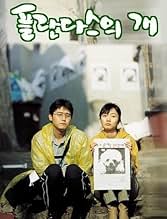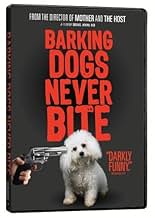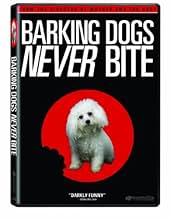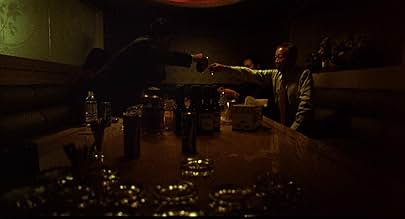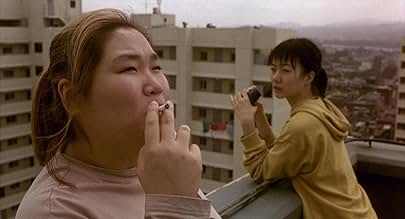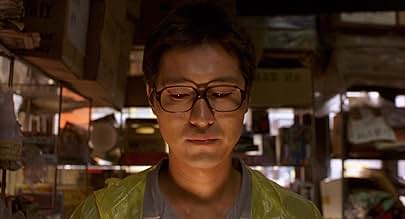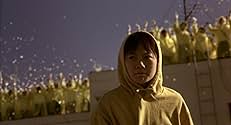IMDb RATING
6.9/10
12K
YOUR RATING
An idle part-time college lecturer is annoyed by the yapping sound of a nearby dog. He decides to take drastic action.An idle part-time college lecturer is annoyed by the yapping sound of a nearby dog. He decides to take drastic action.An idle part-time college lecturer is annoyed by the yapping sound of a nearby dog. He decides to take drastic action.
- Director
- Writers
- Stars
- Awards
- 4 wins & 4 nominations total
Kim Ho-jung
- Eun-sil
- (as Ho-jung Kim)
Byun Hee-Bong
- Janitor
- (as Hie-bong Byeon)
Jin-gu Kim
- Granny
- (as Gin-goo Kim)
- Director
- Writers
- All cast & crew
- Production, box office & more at IMDbPro
Featured reviews
The movie never has a real climax nor is it set up to have one. The most redeeming quality is its passivity. Such a comment may not seem like flattery, but hear me out. The movie very accurately captures the mundaneness that is life and the ever so rare mishaps that disrupt it. If drama is life with the boring parts cut out then this movie manages to successfully cut nothing out. I suppose that is the beauty of the movie: nothing ever seems contrived or pieced together. There are no real villains in this movie nor is it designed for the audience to choose sides. The movie is therefore flat, but in this case that is a good thing because it is different. As far as the comedy goes, on about three or four jokes I genuinely laughed at. Again, they are lines one might hear in real life discourse. Ultimately I got a sense of sincerity out of the movie, and for that it is worth a viewing.
It's possible that this dark comedy will slip from my memory before too long, but as I write this just having viewed the film (on home video), I have to say it made for an excellent viewing experience. It's rare to see a comedy in this day and age with such an offbeat sense of humor, let alone one that keeps viewers guessing so much as to where the plot will head next. There's also a lot of care put into the cinematography and editing of this film, adding some extra layers of satisfaction from a cinephilic perspective; this is one comedy that doesn't insult the viewer's intelligence, and need never be regarded as a guilty pleasure.
Specifically, the way this issue pinpoints its moment in time regarding Korean culture's evolving relationship with dogs is constantly mined for humor, but also provides moments of real insight and touching emotion.
I watched this film on the strength of director Bong Joon-ho's Memories of Murder, an excellent thriller with a deep mordant streak. If this previous film had to be nailed down to a genre, I'd call it a dark comedy -- albeit an extremely idiosyncratic one -- but there are effective splashes of the thriller and horror genres throughout, not to mention some nicely done surrealistic touches. All in all, these two films make me sorely regret missing Bong Joon-ho's "Host" at this year's Toronto film fest; I've added his name to my short list of Korean directors (the others being Park Chan-wook, Hong Sang-soo, and Kim Ki-duk) to follow closely.
Specifically, the way this issue pinpoints its moment in time regarding Korean culture's evolving relationship with dogs is constantly mined for humor, but also provides moments of real insight and touching emotion.
I watched this film on the strength of director Bong Joon-ho's Memories of Murder, an excellent thriller with a deep mordant streak. If this previous film had to be nailed down to a genre, I'd call it a dark comedy -- albeit an extremely idiosyncratic one -- but there are effective splashes of the thriller and horror genres throughout, not to mention some nicely done surrealistic touches. All in all, these two films make me sorely regret missing Bong Joon-ho's "Host" at this year's Toronto film fest; I've added his name to my short list of Korean directors (the others being Park Chan-wook, Hong Sang-soo, and Kim Ki-duk) to follow closely.
Reviewed @Filmmining101
Lovers of the Bong Joon-ho's (now) distinct style will find plenty to love in his directional debut, "Barking Dogs Never Bite" (2000). While the beloved South Korean filmmaker has indulged us into more socially conscious stories supported by sharp commentary around the working and human ethics which bound the film's world, "Barking Dogs Never Bite" is the first step towards an evolutionary scale of artistry that will attract moviegoers around the world for years to come.
Starting his career with a less ambitious (for the lack of a better term) story, the movie features all his known trademarks you would have come to expect (e.g., imposing architecture, isolated main characters, layered storytelling). Dressed heartily with black humor, this comedy centered around missing dogs in a massive apartment complex has reflective undertones about a society that neglects its citizens (before they do it themselves first). Dogs, used as a symbol of status, currency and supply even between the lower socio-economic individuals seem to be having a better life than their owners live in a poetic sense of irony.
Struggling to make means end and lacking a job, our "hero", a dubious and passive academic is in an abusive relationship with his pregnant wife, hates dogs and has no money to buy out his promotion to professor. This protagonist becomes the key player in a tale of theft, misunderstandings and social allegory which the West rarely offers. Typically in a Joon-ho flick, several elements are usually metaphors for the cast's state of mind and the story's progression: cigarettes breaks and dogs represent freedom in a world that relies on self catered interactions to move forward. Bae Donna's character is also stuck in a thankless position of building management conjuring an interesting dynamic with Sung-Jae Lee's pair-less academic and complementing the same coin from a different side.
A master at blending genres with extreme efficiency, Joon-ho manages to generate suspense from the simplest of circumstances; an account of Boiler Kim's (who represents the working and honorable class of South Korea) tragedy feels like something that John Carpenter would direct, echoing similar sentiments in Joon-ho's own Oscar winning "Parasite" (2019) nineteen years later. When the final resolution comes in the complex parable of human relationships, Bong-ho's script keeps the audience guessing on whether this will end in tears or laughs simultaneously making it clear where he and his actors stand. Occasionally it does feel smaller in scale and less engulfing in its thematic presentation than the rest of his iconic filmography with with frequent tonal shifts and a not so likeable main character, especially for those who like dogs. But it is the birth of one of the most important voices in cinema which three years later will give us the masterpiece that "Memories of Murder" is (2003).
Lovers of the Bong Joon-ho's (now) distinct style will find plenty to love in his directional debut, "Barking Dogs Never Bite" (2000). While the beloved South Korean filmmaker has indulged us into more socially conscious stories supported by sharp commentary around the working and human ethics which bound the film's world, "Barking Dogs Never Bite" is the first step towards an evolutionary scale of artistry that will attract moviegoers around the world for years to come.
Starting his career with a less ambitious (for the lack of a better term) story, the movie features all his known trademarks you would have come to expect (e.g., imposing architecture, isolated main characters, layered storytelling). Dressed heartily with black humor, this comedy centered around missing dogs in a massive apartment complex has reflective undertones about a society that neglects its citizens (before they do it themselves first). Dogs, used as a symbol of status, currency and supply even between the lower socio-economic individuals seem to be having a better life than their owners live in a poetic sense of irony.
Struggling to make means end and lacking a job, our "hero", a dubious and passive academic is in an abusive relationship with his pregnant wife, hates dogs and has no money to buy out his promotion to professor. This protagonist becomes the key player in a tale of theft, misunderstandings and social allegory which the West rarely offers. Typically in a Joon-ho flick, several elements are usually metaphors for the cast's state of mind and the story's progression: cigarettes breaks and dogs represent freedom in a world that relies on self catered interactions to move forward. Bae Donna's character is also stuck in a thankless position of building management conjuring an interesting dynamic with Sung-Jae Lee's pair-less academic and complementing the same coin from a different side.
A master at blending genres with extreme efficiency, Joon-ho manages to generate suspense from the simplest of circumstances; an account of Boiler Kim's (who represents the working and honorable class of South Korea) tragedy feels like something that John Carpenter would direct, echoing similar sentiments in Joon-ho's own Oscar winning "Parasite" (2019) nineteen years later. When the final resolution comes in the complex parable of human relationships, Bong-ho's script keeps the audience guessing on whether this will end in tears or laughs simultaneously making it clear where he and his actors stand. Occasionally it does feel smaller in scale and less engulfing in its thematic presentation than the rest of his iconic filmography with with frequent tonal shifts and a not so likeable main character, especially for those who like dogs. But it is the birth of one of the most important voices in cinema which three years later will give us the masterpiece that "Memories of Murder" is (2003).
I only found about this movie through the director Bong Jun Ho, who I think is a legend for producing Salineui Chuak. Anyways my hopes were high for this movie.
This was the debut film for the director Bong and the camera-work and music scores are kind of crude for a recent Korean film. That's not a bad thing since it brings more vibrancy and tension of the situation, especially in the chase scenes.
Some people might find themselves disturbed by the scenes with the dogs, but there isn't much in it, just the fact that they're not treated like your ordinary pet. Try to put yourself into a Korean's point of view where a dog isn't any different from chicken.
The comedy element cannot be missed out too. The situations are so hilarious and fresh, it felt as if my new eye opened. What's amazing is that these situations look realistic and it's believable.
Some marks were deducted because even though the scenes were original and executed well, the director failed to put them all together to have some sort of meaning. It's really weird how my favourite scenes are the ones that could've been cut (like the toilet paper scene and the ghost story in the basement)
This was the debut film for the director Bong and the camera-work and music scores are kind of crude for a recent Korean film. That's not a bad thing since it brings more vibrancy and tension of the situation, especially in the chase scenes.
Some people might find themselves disturbed by the scenes with the dogs, but there isn't much in it, just the fact that they're not treated like your ordinary pet. Try to put yourself into a Korean's point of view where a dog isn't any different from chicken.
The comedy element cannot be missed out too. The situations are so hilarious and fresh, it felt as if my new eye opened. What's amazing is that these situations look realistic and it's believable.
Some marks were deducted because even though the scenes were original and executed well, the director failed to put them all together to have some sort of meaning. It's really weird how my favourite scenes are the ones that could've been cut (like the toilet paper scene and the ghost story in the basement)
There is a trove of criticisms of life in Korea embedded in this film, which was the first from director Bong Joon-ho:
I love some of things he was aiming for, many of which are clear precursors to his later films, but unfortunately, the messages here are wrapped up in a story that's pretty lackluster. A man in a loveless marriage is trying to get a job as a professor and takes out some of his frustrations on the dogs in his apartment complex whose barking irritates him. A janitor in the complex secretly kidnaps dogs to stew them up and eat them. A couple of young women see one of the dogs killed and try to do something about it. It's all kind of blah, which maybe was also part of the point, but it didn't make for compelling viewing to me, particularly as the pace was on the slow side.
- The bribery of professors needed to get a positon at a university.
- The corruption and the use of cheap materials in the construction boom of the late 1980's.
- How the dogs of the affluent live better than many people.
- How worthless a graduate degree in the humanities is.
- How no one in Korea follows the rules.
- How clouds of billowing insecticide are sprayed in a public area for "pest control."
- How at great risk to herself, a bank teller is lauded for taking on an armed robber, rather than rewarded for just doing her job.
- A homeless guy living in a basement who is happy to go to prison, where he'll get regular meals.
- A woman begging for money on public transportation with her small child strapped to her back.
- A woman let go from her job of eleven years because she's gotten pregnant.
I love some of things he was aiming for, many of which are clear precursors to his later films, but unfortunately, the messages here are wrapped up in a story that's pretty lackluster. A man in a loveless marriage is trying to get a job as a professor and takes out some of his frustrations on the dogs in his apartment complex whose barking irritates him. A janitor in the complex secretly kidnaps dogs to stew them up and eat them. A couple of young women see one of the dogs killed and try to do something about it. It's all kind of blah, which maybe was also part of the point, but it didn't make for compelling viewing to me, particularly as the pace was on the slow side.
Did you know
- TriviaMade for around 950 million won (around $800,000/£500,000), Bong Joon Ho was hoping the film would break-even at the box-office, however only around 100,000 viewers nationwide in South Korea saw the film, concluding Bong to note that; "It was a total flop at the box office."
- ConnectionsFeatures Christmas in August (1998)
- SoundtracksBarking Dogs Never Bite
Composed and performed by Cherry Filter
- How long is Barking Dogs Never Bite?Powered by Alexa
Details
Box office
- Gross worldwide
- $45,853
- Runtime
- 1h 50m(110 min)
- Color
- Sound mix
- Aspect ratio
- 1.85 : 1
Contribute to this page
Suggest an edit or add missing content



